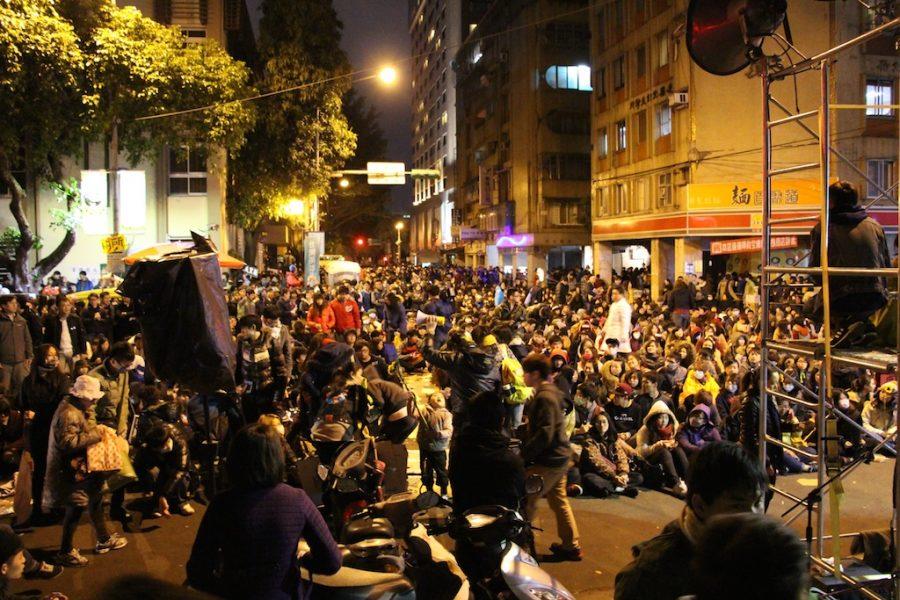Student protesters have made a strong message by taking over the parliament, storming the Executive Yuan and staging a formidable presence on the streets outside of the Legislative Yuan now for over three weeks.
These protests indicate that many Taiwanese are not satisfied with how their government operates, students in particular seem to feel their futures jeopardized; hence taking to the streets to voice their discontent. What’s disappointing is as time has passed this situation has devolved into a political standoff between the KMT and the DPP, with the students caught in the middle with no graceful exit strategy.
Back in July of last year when the government signed the CSSTA they had 8 months to ensure a smooth ratification process would take place in March. The KMT argues it used this time to raise public awareness of the pact, but the public reaction we have seen indicates that their actions . On the other hand the DPP done all it can to capitalize on the CSSTA debacle by using it to galvanize public sentiment against the KMT. This is evidenced by DPP leaders showing up at the protests, publicly condemning the KMT leadership, and reserving Kaida Boulevard for the students on March 30th for their largest demonstration.
Meanwhile the KMT is in no hurry to disperse of the protests because as students do things like vandalize the Executive Yuan, refuse to negotiate, and call for further protests it becomes harder for the public, especially those who aren’t already DPP sympathizers, to side with the students. The KMT is betting that at the end of this debacle the DPP/student protest faction will appear to be extremists, deterring “middle voters” from sympathizing with the DPP. So at the end of the day, the KMT and DPP have created a fiasco by using a trade agreement to win votes for major elections later in the year.
It’s easy to get caught up in the politics, but we must not lose focus on the CSSTA itself. Taiwan unfortunately does not have the upper hand when it comes to negotiating with China, options are very limited or infeasible in terms of retracting or renouncing the CSSTA altogether.
Modifying or rejecting the CSSTA risks escalating tensions with China, for the KMT this would be a detrimental blow to its credibility and legitimacy (Don’t forget the KMT controls both the executive and legislative branches). Furthermore, what little international economic competitiveness Taiwan clings on to will only continue to dissipate if the CSSTA is not ratified. China prevents other nations from signing free-trade agreements with Taiwan until the CSSTA passes, so Taiwan risks further economic isolation in the era of globalization the longer it postpones ratification of the CSSTA. However, the government definitely needs to address student concerns that the CSSTA will have negative impact domestic producers, consumer protection, and lack of legislative oversight.
In terms of how to move on, a joint affirmation from the KMT and DPP to engage in transparent political processes from hereon would not be a bad idea. In addition the government should use the CSSTA as a springboard to aggressively negotiate for free trade agreements with other nations to decrease Taiwan’s economic dependence on China. It seems like Wang Jin-Ping’s visit to the parliament is finally drawing this fiasco to a close. The optimist in me prays the two parties will not paralyze the country again with its power struggles, but what really matters more to them, my prayer or constituent’s votes?
Mathew L. is a senior at Taipei American School.
Cross-Strait Service Trade Agreement: A 17-year-old’s Perspective
April 9, 2014
0
More to Discover


![A collection of college flags. [PHOTO COURTESY OF AMBER HU ('27)]](https://blueandgoldonline.org/wp-content/uploads/2025/05/IMG_5029-1200x577.jpeg)

![An SAT word cloud. [PHOTO COURTESY OF WORDCLOUDS]](https://blueandgoldonline.org/wp-content/uploads/2025/05/SAT.jpeg)
![Collage of banned books, including “The Handmaid’s Tale” by Margaret Atwood. [MINSUN KIM/ THE BLUE & GOLD]](https://blueandgoldonline.org/wp-content/uploads/2025/04/IMG_4274-1200x681.jpeg)

![A collage of dark romance book covers from an online store for dark romance novels. [PHOTO COURTESY OF TRILOGYOFROMANCE.COM.AU]](https://blueandgoldonline.org/wp-content/uploads/2025/04/IMG_4272-1200x600.png)